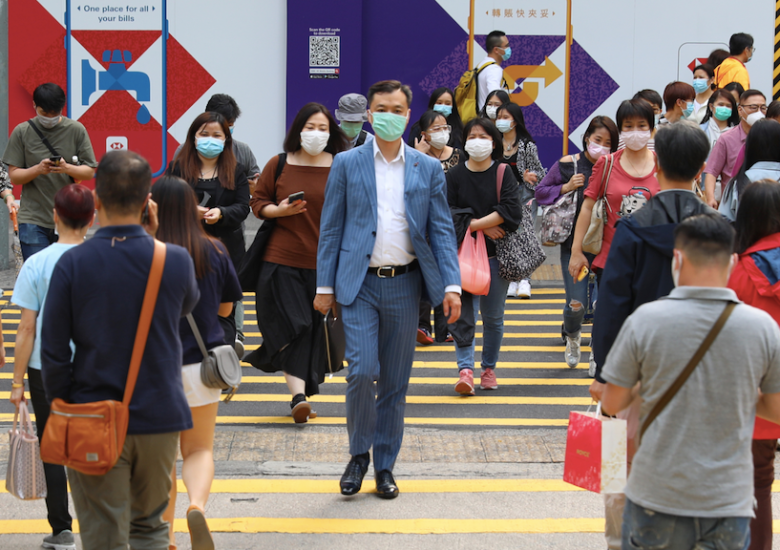Hong Kong, which has recorded no new virus cases for 14 days, is still taking no chances as it prepares to relax social-distancing rules and gradually reopen its border with mainland China.
The city’s government is reported to have secured about 10 million reusable masks to be disbursed to all its residents within a week or two, which will come with replaceable fabric and filters and can be disinfected for reuse up to 60 times.
Officials who have been working hard throughout the past few months and scouring the world for reliable supplies of masks are realizing that the new consignments of facial coverings are no longer urgently needed in their city.
Hong Kong’s government has done an extraordinary job in arresting the spread of Covid-19, defying all the odds that impede its efforts in a teeming city that sits on the verge of mainland China, where the novel coronavirus first struck down people in Wuhan in December.
Hong Kong’s total number of infections was 1,040, with only four fatalities. The city fares well globally and has become one of a few “clean spots” whose streak of no fresh cases has lasted beyond a fortnight, indicating the local spread is receding. The city also compares favorably with other territories of similar size and population density like Singapore, whose tally has broken the 18,000 mark with 18 deaths.
Still, critics and some citizens are not happy with what they say is the government’s belated offer of help, now that masks are no longer hard to come by in the city.
Many are still fuming over the officials’ perceived negligence and foot-dragging on tackling a supply crunch back in February, when the city saw panic buying of masks at the onset of the pandemic. Some are also beginning to drop their guard with the steady flattening of the city’s infection curve over the past month.


Yet officials cite pulmonologists as saying that dropping masks flies in the face of post-plague health protection advisories and masks will only become more indispensable to prevent any flare-ups with the resumption of business and trips.
All of these, the government stresses, are justifications for the plan to give masks to residents and insist they must be worn if people want to get out and about as normal.
Despite the seemingly tardy move, Hong Kong will still be among the few jurisdictions worldwide to dole out reusable masks to the public. Local papers report that it took authorities months of discussions with an undisclosed supplier on mask design and manufacturing and logistical arrangements, and production of the new masks has been ratcheted up in recent months with an inventory big enough to ensure every Hongkonger can be allocated at least one.
Specifications of the new masks, including guidelines on cleaning and disinfection, as well as distribution details, will be announced soon.
The government is hoping that by giving away masks and coming down hard on those who flout the mask rule, the city can return to work without risking a relapse of the contagion.



Meanwhile, famed epidemiologist Keiji Fukuda, a former Assistant Director-General of the World Health Organization who oversaw the United Nations body’s response to swine flu outbreaks and is known as the WHO’s “flu chief,” praised Hong Kong’s approach.
He gave kudos to Hongkongers, and numerous others across Asia, who heeded calls to don masks to stave off the highly infectious pathogen, while many Western countries initially shunned similar suggestions, even when the WHO tried to persuade them to do so.
Fukuda, now the dean of the University of Hong Kong’s School of Public Health, said he would give “a big A” for what Hong Kong had done to curb Covid-19. He said he was particularly impressed by the fact that no doctors or nurses in the city treating patients had been infected, nor there had been any outbreaks at care homes for the elderly, while large numbers of people at similar facilities throughout Europe and the United States had been taken ill.
The health expert, who has been advising Hong Kong’s government, told reporters that the city had earned its due for the achievement, but Hongkongers must continue to steel themselves as the disease would haunt the city and the rest of the world “for many years to come.”
He also defended the government’s late moves such as sealing off the mainland border two weeks after the first imported case from there and shutting bars and gyms only after a cluster of infections had erupted in these venues.
“Many would say why didn’t you act early on, but back then we did not know anything better than the general public [about when and where outbreaks would happen],” said Fukuda, adding that Hong Kong had been tightening and loosening its measures as the situation evolved while trying not to enforce unpopular, draconian measures like city or community lockdowns.
He also praised the city’s prompt decision in March to conduct health screening and virus tests at the airport on Hongkongers fleeing the worsening situation in the US and Europe.
However, he warned that Hong Kong was not out of the woods and sporadic imported infections may still crop up as the virus was still raging elsewhere and may creep back into the city.
Read more: HK to repatriate 5,200 citizens from India, Pakistan
Beijing’s latest moves fuel incredulity
West’s volte-face on efficacy of masks
People, retailers adapt to new normal of bans and lost sales


